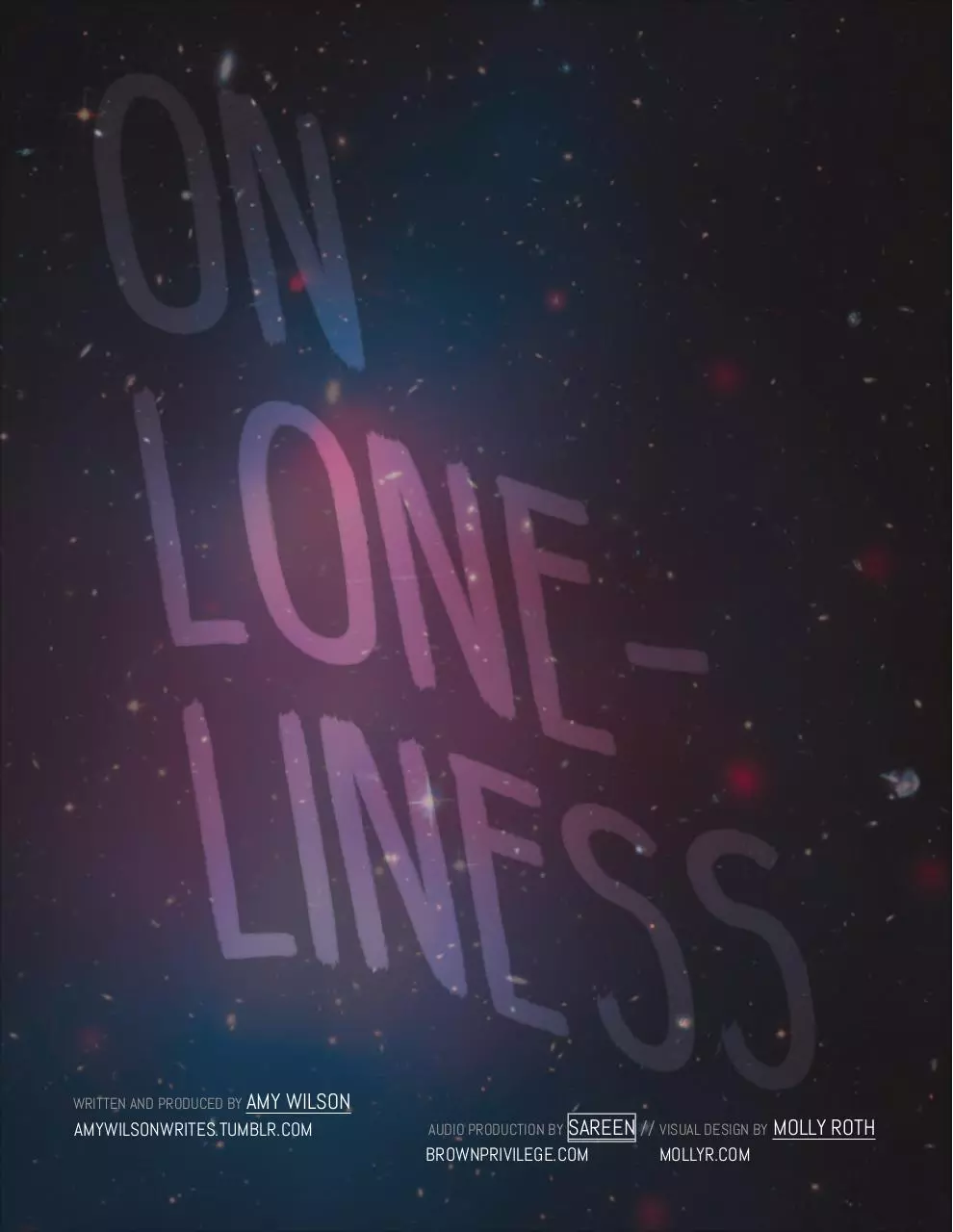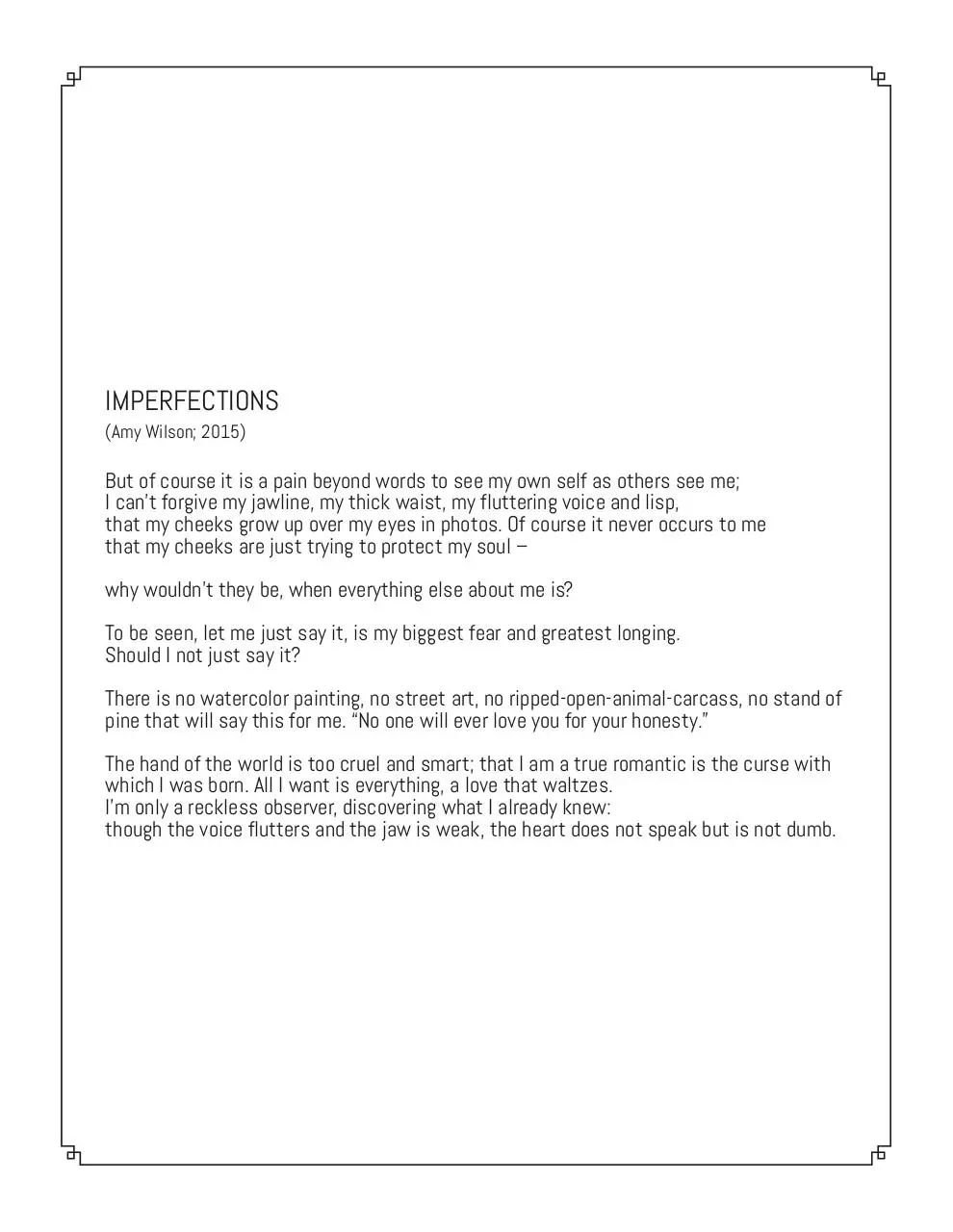on lonelinesspdf (PDF)
File information
This PDF 1.7 document has been generated by Adobe InDesign CC 2015 (Macintosh) / Adobe PDF Library 15.0, and has been sent on pdf-archive.com on 19/12/2015 at 03:58, from IP address 66.65.x.x.
The current document download page has been viewed 494 times.
File size: 436.51 KB (11 pages).
Privacy: public file





File preview
WRITTEN AND PRODUCED BY AMY
WILSON
AMYWILSONWRITES.TUMBLR.COM
AUDIO PRODUCTION BY
SAREEN // VISUAL DESIGN BY MOLLY ROTH
BROWNPRIVILEGE.COM
MOLLYR.COM
Dear friends,
Thank you for engaging with ON LONELINESS, my holiday season
audio special. I’m pleased to share with you here the poetry you
heard in the recording, including some of my own.
I call my work “deliberately internal” and this is why. We all carry
vast secret worlds inside us: my own secret world is a source of
both isolation and strength. The connections between our internal
selves form a network along which flows empathy: empathy is a
force for good.
Wishing you the best,
Amy Wilson
andhowever@gmail.com
SPECIAL THANKS TO:
CHRISTOPHER ANKNEY
ANNA BELEW
EMILY CLADER
LOIS KANE
DANE LARSEN
JIM MANHEIM
BO REN
CAROLYN RACINE
HOLLY PAINTER
I:
N
O
I
T
SEC
ING
C
N
E
S
I
S
R
E
E
N
P
I
X
L
LONE
E
LONG AFTERNOONS
(Adam Zagajewski, translated by Clare Cavanagh; 1998)
Those were the long afternoons when poetry left me.
The river flowed patiently, nudging lazy boats to sea
Long afternoons, the coast of ivory
Shadows lounged in the streets, haughty manikins in shopfronts
stared at me with bold and hostile eyes.
Professors left their school with vacant faces
as if the Illiad had finally done them in.
Evening papers brought disturbing news,
but nothing happened, no one hurried.
There was no one in the windows, you weren’t there;
even nuns seemed ashamed of their lives.
Those were the long afternoons when poetry vanished
and I was left with the city’s opaque demon,
like a poor traveller stranded outside the Gare du Nord
with his bulging suitcase wrapped in twine
and September’s black rain falling.
Oh, tell me how to cure myself of irony, the gaze
that sees but doesn’t penetrate; tell me how to cure myself
of silence.
From Mysticism for Beginners, published by Farrar Strauss & Giroux.
IMPERFECTIONS
(Amy Wilson; 2015)
But of course it is a pain beyond words to see my own self as others see me;
I can’t forgive my jawline, my thick waist, my fluttering voice and lisp,
that my cheeks grow up over my eyes in photos. Of course it never occurs to me
that my cheeks are just trying to protect my soul –
why wouldn’t they be, when everything else about me is?
To be seen, let me just say it, is my biggest fear and greatest longing.
Should I not just say it?
There is no watercolor painting, no street art, no ripped-open-animal-carcass, no stand of
pine that will say this for me. “No one will ever love you for your honesty.”
The hand of the world is too cruel and smart; that I am a true romantic is the curse with
which I was born. All I want is everything, a love that waltzes.
I’m only a reckless observer, discovering what I already knew:
though the voice flutters and the jaw is weak, the heart does not speak but is not dumb.
II:
N
O
I
T
SEC
G
N
I
V
R
E
OBS
NE
I
L
E
N
O
L
SS
LOT’S WIFE
(Anna Akhmatova, translated by Meryl Natchez; 1924)
God’s luminous messenger, larger than life,
Led the one righteous man along the black mountain.
But regret cried out to his wife:
“It’s not too late, you can still catch a glimpse
of Sodom, the red rooftops of home,
The square where you sang, the yard where you spun,
The tall house, its windows abandoned –
The house where your daughters and sons were born.”
She looked back – a sudden arc of pain
Stripped her eyes of sight,
Fused her feet to the ground –
Her flesh became transparent salt.
Who will mourn this nameless woman?
She seems the least of all we lack.
Yet I, for one, can never forget
How she gave her life for one look back.
This translation appears in Poems from the Stray Dog Café, published by hit & run press.
AN ACCOUNT
(Amy Wilson; 2015)
The man on the subway wears earbuds and a do-rag and a sweatshirt with an anxious
iguana on it, bright yellow. His companion reads Huey Newton and carries a pink plastic
bag from Ricky’s. Her curly hair, her perched pink knit beret, are perfect. Her warm plaid
coat, her black lipstick. They were on the train when I got here. They are black.
His skateboard is hooked over the side railing of his seat. I hear the clicking sound and
look up from my book, which is describing homesickness in delicate exquisite detail. It is
Brooklyn by Colm Toibin. I am feeling sorry for myself. He is solving a Rubik’s cube.
Swift and irregular clicking, well-practiced. I see him come close, one side all orange,
and continue on. Can’t leave that one side all orange I suppose. The expression on his
face never changes. Only his hands show what must be a huge and restless intelligence. I
think of an octopus and how it will starve itself to death. I think of an octopus and how it
will predict the future. The clicking stops.
He holds the cube in his palms and they get off at 6th Avenue. “It’s not that many stops
between 14th and 59th,” he says to her. I have one more stop to go, but the itching in my
own heart feels slightly better now.
III:
N
O
I
T
SEC
NG
I
D
N
A
T
ESS
N
I
NDERS
L
U
E
N
LO
Download on lonelinesspdf
on_lonelinesspdf.pdf (PDF, 436.51 KB)
Download PDF
Share this file on social networks
Link to this page
Permanent link
Use the permanent link to the download page to share your document on Facebook, Twitter, LinkedIn, or directly with a contact by e-Mail, Messenger, Whatsapp, Line..
Short link
Use the short link to share your document on Twitter or by text message (SMS)
HTML Code
Copy the following HTML code to share your document on a Website or Blog
QR Code to this page

This file has been shared publicly by a user of PDF Archive.
Document ID: 0000325100.